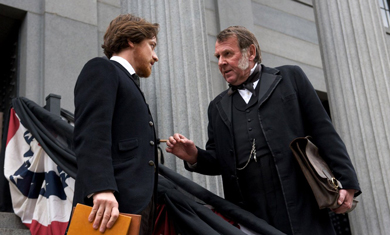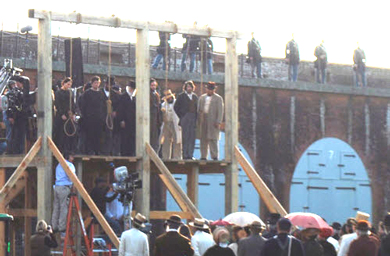
 |
|
|
|
The movies have mostly steered clear of serious looks at the politics of the American Civil War for the same reason that we don't have an accurate movie about the Alamo: film companies can't afford to offend a big sector of the paying audience. Before Robert Redford's new film The Conspirator, the only Hollywood movie I can recall about the assassins of President Lincoln is John Ford's The Prisoner of Shark Island (1936). That film claims that accused conspirator Dr. Mudd (Warner Baxter), the M.D. who set John Wilkes Booth's broken leg, was unjustly convicted. We see Mudd arguing in court that he couldn't possibly have been part of the conspiracy: how could Booth have known that he would break his leg and need a doctor? That's all well and good but in reality there is plenty of evidence to place Mudd among the conspirators. He met with Booth three times before the assassination and even introduced the actor to the son of the boarding house owner where the conspiracy was hatched. As it turns out, Ford's Shark Island is less historically reliable than some of his westerns (but still a great movie). 
The American Film Company aims to present historical truth in its films, and the suspenseful The Conspirator does indeed stick to the facts. Beginning with the assassination, we see young lawyer-soldier Frederick Aiken (James McAvoy) given the undesirable job of defending Mary Surratt (Robin Wright), one of the accused conspirators. Aiken is assisting Senator Reverdy Johnson (Tom Wilkinson), who stresses the need for a fair trial in the politically volatile post-surrender atmosphere. The Secretary of War Edwin Stanton (Kevin Kline) wants the assassination conspiracy trial cleaned up right away and the guilty hung, so that the nation "can begin to heal". When Johnson steps down to protect his career, Aiken becomes Surratt's only counsel. Secretary Stanton feigns neutrality but acts behind the scenes to insure swift convictions. Aiken continues to fiercely defend Mary Surratt, the mother of a conspirator still at large. A Southern sympathizer, Mary ran the boarding house where the conspirators gathered. Aiken carefully deflects the prosecution's attempts to directly implicate Mary, but finds his efforts stymied by the rulings of the court. His witnesses change their testimony and his appeals are denied; another conspirator (Stephen Root) is given immunity and names Mary as an active member. Aiken must finally bring Mary's daughter Anna (Evan Rachel Wood) in to testify that her mother is innocent, and her own brother guilty. Meanwhile, Frederick Aiken finds that his vigorous defense has made him a political pariah. Considered a traitor for doing his job diligently, he's blackballed from his social club. His own fianceé considers dropping him. It looks as if Mary Surratt will be unjustly convicted, just the same. The Conspirator is rigorously faithful to the facts of the case and reasonably fair in its presentation of what really was a seriously rigged trial. The public outcry for revenge against the killers of Lincoln was enormous. It was definitely not the time to be related to a conspirator, or to be a Southern sympathizer in a boarding house that had seen months of secret meetings and plots. Redford generously shares equal billing with his screenwriters James D. Solomon and Gregory Bernstein. The script enlists its characters to carry specific points of view. Frederick Aiken seems to be the only man in America who still believes the accused assassins ought to have a fair trial, and the script requires that even he undergo a change of heart before he's convinced that the defendants have rights. He comes off like an investigating hero in a contemporary legal thriller. We know Aiken is a man alone when his girlfriend whines and complains that his stubborn insistence on defending those "villains" is ruining her social life. As in a classic liberal lost-cause movie, Aiken is the "one hero alone" against all the might of institutionalized mob rule. 
Further tainting The Conspirator is its agenda to present a parallel to the state of our nation post- 9/11. It's not even subtext. The script associates the climate of fear, suspicion and hatred after the assassination with our present state of heightened security hysteria and eroding civil liberties. The script's dialogue is peppered with lines that apply equally to our present Patriot Act years: "You're keeping fear alive as long as you see fit!" ... "Why did I fight for the truth if our rights are to be taken away?" We understand these parallels without having them fed to us as a Kindergarten lesson. The film also looks back to a famous liberal western from the McCarthy era. Defending counsel Reverdy Johnson has clearly been advised by higher ups to abandon the case for his political well being. Screenwriter Solomon has Aiken watch as Johnson takes off for a 'business trip' to evade his responsibility. The moment functions identically to a key scene in Fred Zinnemann's High Noon, where the judge played by Otto Kruger leaves town, taking the scales of justice with him. Let me say here that I agree with Redford and Johnson's political positions. I just think that the back-loaded messages in The Conspirator make the film seem less objective. Nobody likes being lectured to, even when we agree with the lesson. Having Aiken only slowly become convinced of the unfairness of the tribunal is a dodge straight from a Stanley Kramer "controversy" movie. We know that Aiken will come around to the proper liberal position, just when doing so will be advantageous to the drama. The real parallel brought up in most articles and reviews about The Conspirator is the planned military trials for prisoners in Guantanamo. Mary Surratt's prejudicial imprisonment is comparable to the harsh treatment of Guantanamo detainees. Beyond that the comparisons begin to fade. The Guantanamo detainees are not U.S. citizens. Surratt has not been arrested on a whim or a technicality; even without the prosecution's tricks the evidence makes her seem culpable. But many viewers of The Conspirator will decide that Mary Surratt is an innocent victim, for the wrong reasons. They won't remember that, at the very least, she was aware that her son and John Wilkes Booth had tried to kidnap the President. She was in a position to save Lincoln, and did nothing. 
The bulk of the movie examines the kangaroo trial, where the prosecution gets all the breaks and Aiken's elegant defense measures are thrown out one after another. Aiken finds a witness who can demolish the prosecution's case, but the witness changes his testimony in the courtroom. Either the prosecution interfered with the witness, or they planted him to sabotage Aiken's case. When Surratt is condemned, Aiken uses a last-ditch legal maneuver to delay the execution. The Secretary of War crosses Washington City in the middle of the night to get the president to vacate the motion. The Conspirator then goes into a full and faithful depiction of the multiple hanging, drawing the process out for a full effect, as in an anti-capital punishment movie. But it doesn't have the gut-wrenching effect of similar scenes in Paths of Glory and Breaker Morant. What the film does communicate well is the climate of fear and vengeance seeking that caused the government to suspend its own laws in the interests of national security. The first presidential assassination came at a crucially unstable time. The higher-ups that permitted the railroading of the defendants feared for the security of the government itself. The American experiment had barely survived the Civil War, and the just rule of law was a casualty of a post-assassination political storm. The film's postscript supports this 'temporary insanity' plea for the country's state of politics. Captured only two years later, a key conspirator is tried in a civilian court and set free by a mistrial. Interpreting these events by the yardstick of today's mega-injustices -- legal, economic, political -- only works so far. Redford's reconstruction of the period cannot be faulted. The assassination and the military trial are presented without exaggeration and the costumes, crowd scenes, etc. are very convincing. The actors are all acceptable in this rather constricted story. Robin Wright makes a formidable defendant, a strong woman well aware of what she's up against. The actors and Redford can be complimented for making the characters behave and talk as Washingtonians might have in 1865. If anything they might be a little too genteel, considering the tensions in the capitol. I was particularly impressed by Aiken's response to the insulting notice that he'll not be allowed entry into his social club. A typical 2011 movie would have the lawyer become incensed, storm in and shout out his protest, if not punch somebody in the nose. No, Aiken behaves in a much more civilized manner. 
A recommended title for viewers interested in this period is MGM's The Tall Target. It's an exceptionally good thriller about a government agent's attempt to foil an earlier assassination plot against Lincoln, on a train. It's a partially true story, and has no desire to preach -- even though the character list is riddled with committed Confederate agents determined to exact vengeance on the victorious President. Lionsgate's Blu-ray of The Conspirator is a good-looking disc that flatters the film's visual contrasts, between hazy gray interiors and the summer colors of what was once called Washington City. The American Film Company's Deluxe Edition offers a full roster of extras. Robert Redford's commentary can be also be accessed as a BonusView picture-in-picture feature. A making-of featurette is the expected marketing piece, but most of the extras have a solid educational value. Director Tom Jennings' fine 67-minute docu The Conspirator: The Plot to Kill Lincoln provides an excellent accompaniment to the feature. Ten separate, shorter "Witness History" featurettes see historians discussing various facets of the assassination, such as Mary Surratt's role. The menu formatting is fast and simple; the only drawback to the disc is the forced viewing (on my player, at least) of a brief American Film Company promo before the menu comes up, which contains scenes from the film and at least one spoiler. The other four or five trailers can be skipped one at a time, but not that one.
On a scale of Excellent, Good, Fair, and Poor,
The Conspirator Blu-ray rates:
Reviews on the Savant main site have additional credits information and are often updated and annotated with reader input and graphics. Also, don't forget the 2011 Savant Wish List. T'was Ever Thus.
Review Staff | About DVD Talk | Newsletter Subscribe | Join DVD Talk Forum |
| ||||||||||||||||||